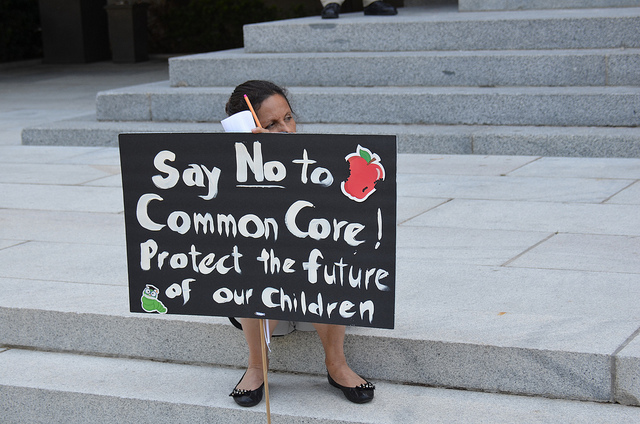Flying from California to New York and stopping in the middle, I moved from relative balmy and calm debates over the common core to fierce storms. In CA, implementation was delayed, and relatively smooth, with minimal pushback and very few opt outs from testing. In other places it is very different with an astounding 20% of students in NY opting out.
If you talk to the person on the street, teacher in the classroom, Brooklyn College math professor, parents around the dinner table or listen to the political debates, the common core is in serious trouble.
I was reminded of this at a Midwestern airport bar and later in NY, where I struggled and failed to convince, literally everyone there, not to “hate” the common core.
It started with a simple, standard bar question over a beer. “What do I do?” And when I said I work in education, I was asked if I liked the common core. Immediately folks nearby who were eavesdropping interjected, they “hate” the Common Core, as parents, they could not help their children do the homework even at elementary grades.
Another voice, a teacher from Arizona, it’s terrible, the students aren’t ready. The questioner agrees with them, and says she wants to have her kid go to a private school without Common Core, more folks pile on—I am the only one of probably 8-10 people who is trying, backed into the corner, to justify this reform. Nobody is convinced.
Landing in NY, it was more of the same. Common core has been associated with the sometimes stultifying testing regimes, flawed evaluation systems, and the general unfunnning of the American school as place to work or attend.
Coming from NY where we were early adopters and living in California now, which two years later just had its first real Common Core assessments, there are tangible differences in reactions. The effects are regional, and vary significantly, but we have some real lessons to learn here, and for those of us too often mired in the ivory tower of curriculum or policy, we need to actually listen.
I was in NY when the Common Core was dropped like a ton of bricks. There were not good supports or training for teachers, families were bit befuddled as test scores plummeted, and I did see then the effects on kids. It was painful. I went to school the first day of testing. It was sad.
Students were demoralized. Very strong students could not finish the test, literally for the first time. And students who struggled with literacy or comprehension could not understand the questions, and the questioning techniques on it, when they had been drilled for years on answering simpler multiple choice scenarios.
And while everyone selling some educational product would tell you it was “common core aligned” you really could not know. Curricula, assessments, and professional development around common core were somewhat crap shoots, and teachers felt it.
NY also waged a bloody battle to include student test scores in teacher evaluations, something that seems to make a lot of sense but really is plagued with unresolved issues around student demographics, data, and variability. So much so, that I think I have to revise my previous support until we know that the evaluations are reliable and valid.
Then test scores came out, proficiency plummeted, and families were slapped in the face with a harsh reality that until then had been hidden from them.
So there is a lot of bitter medicine in the common core, and it is widely shared, and in NY we slammed the whole bottle. NY is sick educationally, so I get the urgency, but in retrospect we OD’d a little.
California has been slower on the draw. Waiting a couple of years, NY’s teachers had created some great curricular resources (engageny.org) which the rest of the country is now using, assessment companies had aligned interim tests, and there were better supports for educators (not sure about families). And the response is much milder here around common core.
Still pushback, but it’s not as pronounced or intense. There have been minimal opt outs (less than 1%), and not the vehemence against the shift.
Even strong and needed medicine, taken too quickly, can lead to stomach contractions and vomiting. Many states and stakeholders are caught in that vomit in the mouth moment right now, considering weakening or repealing common core.
American education is sick, but when we don’t listen to the patient, we risk imposing a cure that feels worse than the disease, which will eventually be discarded. One more good idea, poorly implemented, and tossed atop the scrap heap of “failed” reforms.


Isn’t part of the secret to low opt-outs in California the complete lack of accountability for results on the standards-aligned tests? If so, then is it really a better scenario for kids in low-performing schools?
I dont think in practice there is any more “accountability” around common core in NY than CA, I would bet a higher percentage of schools are in “turnaround” in Oakland than NYC, and I think 90 some percent of teachers in NYC were rated effective. I dont think most teachers feared losing their jobs or schools really feared closing more from the CC. Its really a psychic experience that families and staff have from CC (in my opinion) and those seem very different in different places. Appreciate the thoughts